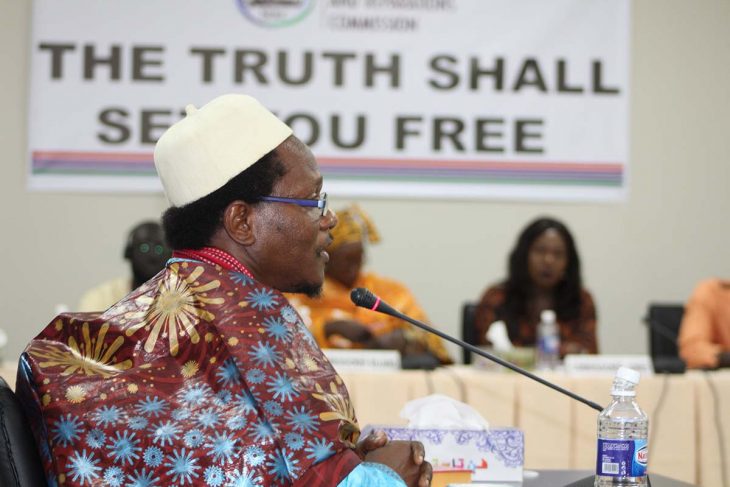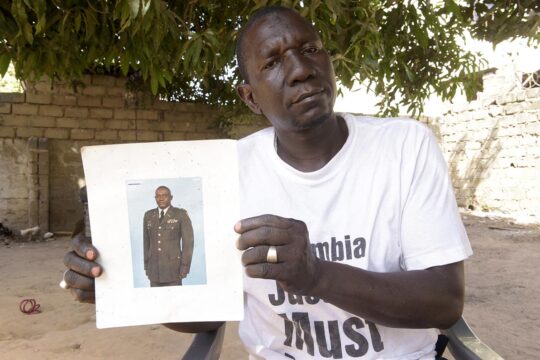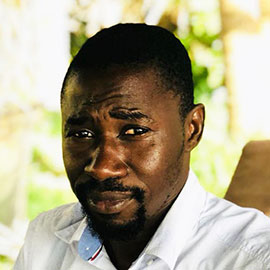It was one of the most awaited decisions after the national Truth, Reconciliation and Reparations Commission (TRRC) concluded its final report late 2021 on a transitional justice process that has gripped Gambia for three years. The TRRC has established an amnesty committee led by James Allen Yaw Odico, an Anglican bishop in the Gambia andone of the TRRC commissioners.
Unlike the Commission’s public sessions that ran from January 2019 to May 2021, the amnesty sessions took place in a total media blackout. Not even the Commission’s media unit had any significant information to share during the process.
On March 16 the amnesty committee’s report was finally approved by the 11 members of the TRRC before it was submitted to Gambia’s Justice minister Dawda Jallow. “These are recommendations and the government will make its final decisions in a whitepaper to be issued before the end of May,” Jallow told Justice Info.
Out of 25 applications for amnesty, 11 were dismissed, 8 denied, 5 approved while 1 was granted immunity, according to the Committee’s report. In theory those who are denied should be sent for trial.
Those denied and those approved
The 11 dismissed applicants are either because they were not recommended for prosecution by the TRRC or were only banned from holding public office inthe Commission’s report.They include army major Wassa Camara and Lt. Colonel Amadou Bojang, anti-narcotic officer Ebrima Drammeh, former police crime management coordinator Baboucarr Sowe, deputy superintendent of police Lamin Cham, former jungler Yusupha Sanneh, former director of National Intelligence Agency (NIA) Lamin Bo Badjie, and NIA members Basiru Sey, Omar Cham, Tijan Bah, and Harry Sambou.
Amnesty applications from 8 people recommended for prosecutions were denied. This list includes former vice-president Dr Isatou Njie-Saidy; former Defense minister Edward Singhatey; his brother Peter Singhatey, a former influential military captain; former “Junglers” – a hit-squad under the orders of former president Yahya Jammeh – Lt. Malick Jatta, Pa Ousman Sanneh and Omar A. Jallow; and former soldiers Baboucarr Njie and John Charles B. Mendy.
Five other applicants were recommended for amnesty: former number 2 of the 1994 military junta Sanna Sabally; a soldier involved in the 1995 torture of political detainees Major Bubacarr Bah; junior soldiers implicated in November 11, 1994, executions Baboucarr Mboob and Zakaria Darboe; and a lower ranking soldier involved in the June 1995 murder of former Finance minister Ousman Koro Ceesay, Pa Alieu Gomez.
A ex-soldier, Alagie Kanyi, who confessed to participation in the November 11, 1994, executions and in the murder of Koro Ceesay apparently had an immunity deal with the Commission. Everyone at the ministry of Justice and the TRRC is tightlipped about this. Sources at the Commission indicated the case would be finalized by the Ministry. It may suggest that the TRRC had an immunity deal with him in exchange for this testimony which was crucial in the trial of Yankuba Touray - a former senior member of Jammeh’s junta who was sentenced to death in July 2021 – and in establishing the circumstances of the murder of Koro Ceesay.
The release of the TRRC amnesty committee conclusions was followed by serious criticism from victims groups. “The victims decry the lack of transparency and zero victim participation in the amnesty policy development and approval process and demand that this be disclosed to the victims who wish to know… forthwith,” read a statement issued on March 19 on behalf of 11 direct victims of Sabally whose relatives were executed on November 11, 1994. The statement was also signed by six pro-rights organisations in the country.
The case of Sanna Sabally
The last time Gambia’s TRRC was engulfed in so much criticism was in October 2019 when it brokered a public reconciliation hearing between ex-junta members Sanna Sabally and Edward Singhatey who had a grave fall-out in January1995. Sabally had testified before the Commission on April 24, and Singhatey on October 16 before they were brought together to reconcile before the Commission. But many people called it a charade that sought to reconcile murderers who had later turned to be victims of Jammeh’s rule.
And so, after the announcement by the amnesty committee it was the case of Sabally that triggered the biggest controversy. Following the July 1994 military coup, Sabally was the country's second most powerful man. He was accompanied by a ruthless bunch of soldiers that shot people, vehicles and bicyclists who would find themselves on the vice chairman’s path as his convoy passed. On November 11 that year, Sabally would lead an operation to crush an alleged counter-coup led by 11 soldiers. Sabally and his men were ordered to “take no prisoners”, according to his testimony before the Truth commission. The arrested soldiers were summarily executed. This would go into Gambian history as the ‘November 11 Incident’.
Shortly afterwards, on January 27, 1995, the popular and ‘temperamental’ vice-chairman of the junta as well as his colleague Interior minister Sadibu Hydara were themselves arrested on charges of planning a coup. Edward Singhatey supervised the arrests. Sabally was subject to torture and jailed for 10 years. Hydara died in June 1995 as a result of torture.
Sabally’s testimony before the TRRC was a memorable moment in the often spectacular public hearings process. He was the TRRC’s biggest catch. Sabally admitted to his crimes, revealed who had ordered the 11 November executions, apologized and asked for forgiveness, including from one of his civilian victims who was confronted to him during the hearing.
In short, he complied with everything a perpetrator is required to do before the TRRC to hope for an amnesty. But for some of his victims he should still have been tried. “I grew up without a father, without his love and companionship which was very difficult for me and my family,” said Abdou Aziz Barrow, son of ex-lieutenant and leader of the alleged November coup attempt Basiru Barrow. “A day doesn’t go by without me being re-traumatised by the events and manner in which he and his companions were gruesomely killed on November 11.”
The Commission has not publicly explained the rationale for its amnesty decision that the victims now call on the government to disregard.
The controversy over released Junglers
The government is already caught into another controversy over the detention and release of two former Junglers, Ismaila Jammeh and Alieu Jeng. The two had appeared before the Truth commission in July 2019 and were found to have been untruthful. On March 18, the army announced they were being released on “stringent bail” conditions. “The concerned soldiers were arrested and put under detention at Yundum Barracks since 2017 for their alleged involvement in human rights violations under the former regime,” said the army. “Their continuous detention without being held on any crime is not tenable under Service Laws and Regulations,” it further said.
On March 19, the Victims Centre called the release of these two Junglers “unfortunate”, criticizing the Justice ministry for not charging them. For the Ministry though, any decision to charge perpetrators of human rights violations would preempt their coming white paper on post-TRRC prosecutions.
A reference in the army’s statement was also made to the January 2022 return from Equatorial Guinea of Karafa Bojang, also known as Sulayman Badgie. Badgie had returned to Gambia with 14 other people, three of whom — Sulayman “Saul” Badjie, Landing Tamba and Musa Badjie — were mentioned as perpetrators in the TRRC final report.
Badgie was the head of the notorious Junglers. After his return, he was briefly detained at a state-run Friendship hotel, and taken to court to secure his detention without charge. But the High court dismissed the state's applications and set him and his colleagues free on February 2. “Interestingly, the High Court in its deliberations took notice of the findings and recommendations of the Truth, Reconciliation and Reparation Commission (TRRC), but did not consider such as sufficient grounds to detain the suspects without charges, regardless of their ranks and influence in the Army,” said the army statement.
This is all happening against the background of a deep suspicion held by victims that Gambia’s president Adama Barrow is not interested in justice for Yahya Jammeh-era crimes since he got re-elected last December on a coalition with Jammeh’s party, the Alliance for Patriotic Reorientation and Construction Party.







